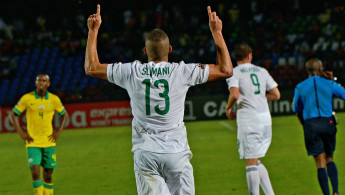Desert Foxes offer distraction but also disclosure
The rain didn’t stop them. The hour didn’t stop them. In the south, ethnic conflict didn’t even stop them – at least for a short while.
Football has always been a big deal in Algeria. And at no time more than when the Desert Foxes, as the national team is known, contest a major tournament. Last year, Algeria did better than ever at a World Cup. It is only natural that hopes are high for this year’s African Cup of Nations.
| Many of us say that this team doesn’t really represent us, so I can’t pretend to be happy. - Mustapha, 40 |
Celebrations after the team’s opening victory against South Africa last week duly lasted into the early morning hours. On the rain soaked streets of the capital Algiers, fans celebrated until late, horns blaring, music loud.
No one was too young. Islam, 8, could reel off the names of every player on the national team. He’d stayed up to watch the game with his father and siblings, in the family clothes shop in the downtown area.
“I love football,” he said. “I love watching the team play particularly when they win.”
Islam’s father said his boy loves everything about the game, from parading with other fans, chanting in unison, to playing in the streets himself.
And football is not the exclusive domain of boys or men either. Louisa, who did not give a last name, said her two daughters could barely contain themselves with excitement whenever a game was one.
Old or young, she said, the furniture is always in danger when football is on the TV. “You should see them jump.”
But that’s Algiers, in the north. There celebrations went into the small hours of the night. In the south, 600 km away, the situation was different.
There, in Ghardaia, ethnic tensions between Berber Mozabites and Chaamba Arabs have divided the town of nearly 100,000 people since last year. Two weeks ago, clashes erupted, eroding a precarious balance of trust between the city’s residents.
Celebrations were cut short here for fear that clashes might resume. Nevertheless, they did go ahead, and for two hours, revellers paraded through down-town celebrating the 3-1 victory of South Africa.
Still, here, in the south, some of Algeria’s deeper fault lines become clear, divisions that, if anything, football only exacerbates.
Mustapha, 40, is a Mozabite construction worker. He lives with his wife and two kids in Bab Lehteb, one the numerous Berber-speaking neighbourhoods of the city. The fate of the Desert Foxes, he said, leaves him cold.
"I'm not a football fan at all when it comes to this team,” he said. "I would have preferred if they took locals instead of throwing away all this huge amounts of money for recruiting foreign-born nationals who have no prior knowledge of this country.
"Many of us [Mozabites] say that this team doesn’t really represent us, so I can’t pretend to be happy and go into the street to celebrate their victory."
In addition, he added, the current situation didn't really allow those wanting to celebrate to do so.
"The material damage caused by the clashes was huge. More than two hundred houses were destroyed two weeks ago. What’s there to celebrate?" he asked.
There was little to celebrate a few days later. Again, streets emptied as Algeria’s team prepared to face another fierce rival and seal a place in the second round. But Friday’s game didn’t engender any moral dilemmas about celebrating.
Ghana beat the Desert Foxes 1-0. The group is now finely poised going into the last round of matches. In Algeria, fans still sound confident, however.
"We have faith in our players," said Aomar Fekrache, a journalist from Algiers.
Nevertheless, many Algerians will likely watch Tuesday's final do-or-die game against on Senegal with some trepidation. Streets will empty. Many – but not all – will again be cheering for their Desert Foxes.


![President Pezeshkian has denounced Israel's attacks on Lebanon [Getty]](/sites/default/files/styles/image_684x385/public/2173482924.jpeg?h=a5f2f23a&itok=q3evVtko)



 Follow the Middle East's top stories in English at The New Arab on Google News
Follow the Middle East's top stories in English at The New Arab on Google News


